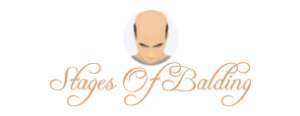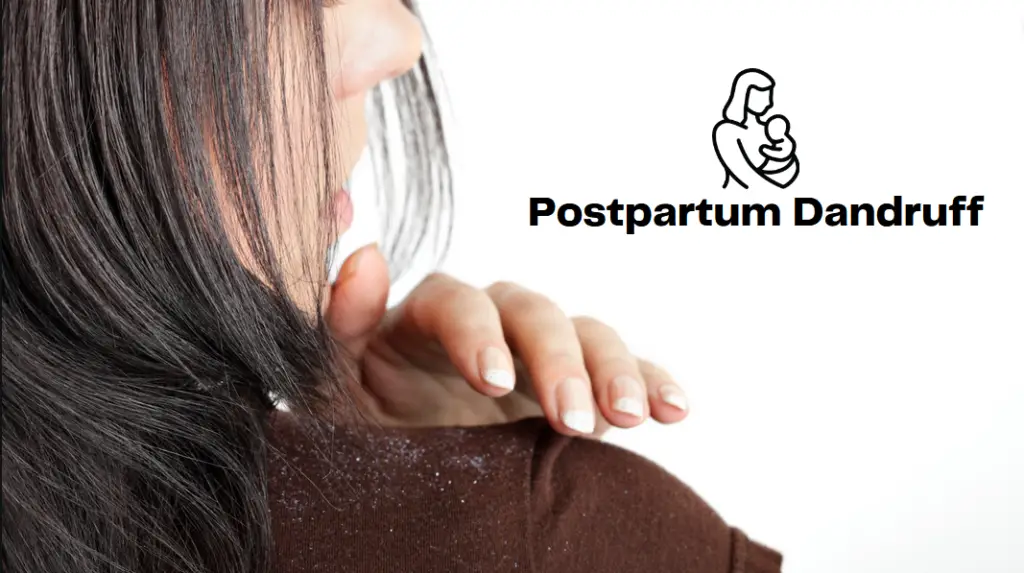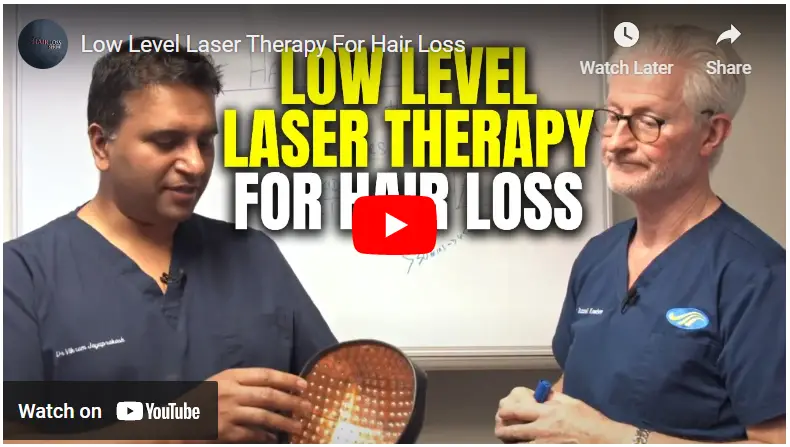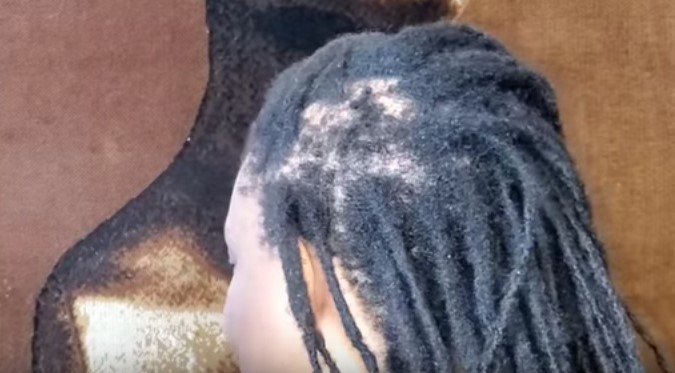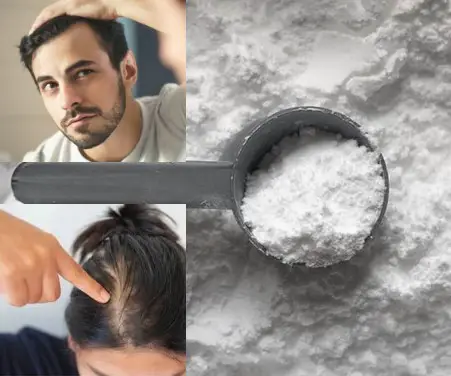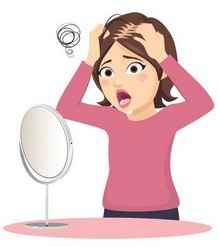Postpartum Dandruff is a common problem that women suffer from after having babies. It’s the result of the shed of hair cells that are found on the scalp.
To fight postpartum Dandruff, it is possible to use shampoo Dandruff, such as Head & Shoulders, which is available at grocery stores as well as the travel size.
You may also want to stop using chemically based treatments, such as highlights, perms, and straightening treatments, until the shedding ceases. If you’re experiencing excessive hair loss or any other signs, you should speak with your doctor.
What are the causes of postpartum Dandruff?
Postpartum Dandruff is caused by the acceleration of the process of shedding old skin cells from the scalp and causing pieces of flaky, dead skin on the scalp. Dehydration, hormonal fluctuations, as well as emotional and physical stress can also trigger or cause irritation on the scalp postpartum.
Dandruff is frequently associated with other skin conditions like seborrheic or eczema, according to NHS., It could be triggered by irritated, oily, or dry skin and a yeast-like fungus (Malassezia), which feeds off oils on the scalps of a majority of adults, as well as sensitivity to products for hair care (contact dermatology). Stress can cause Dandruff to occur or aggravate the symptoms already present.
Related Post:
- Serum for Postpartum Hair Loss: My Best 1+
- Vitamins For Postpartum Hair Loss | Biotin Help After Pregnancy!
Does Dandruff Cause Postpartum Hair Loss?
Postpartum hair loss is a very common complication among new mothers, affecting up to 50%. This condition is due to hormone fluctuations after a gestation that cause more hair than usual to enter the resting stage and fall out over time. Dandruff was not mentioned as a cause; however, chemical-based treatments should be avoided during this time; excessive or sudden loss should be discussed with the healthcare provider as soon as possible if experienced.
What Causes Dandruff?
Dandruff is a scalp condition in which flaking of the skin occurs, and there may be itching1. Dandruff may have various causes, including irritation to oily or dry skin, Malassezia (a yeast-like fungus that feeds off oil secreted by hair follicles) feeding off these oils secreted onto adult scalps, contact dermatitis with hair care products (known as Malassezia dermatitis) as well as skin conditions such as psoriasis or eczema. Poor hygiene does not play a part either; however, flakes may become more noticeable if one fails to wash or brush their hair regularly.
How to deal with the postpartum treatment of Dandruff
To treat postpartum Dandruff, you can try a shampoo that contains an active ingredient such as ciclopirox olamine. It assists in soothing scalp itching and moisturizes them. It also removes flakes of Dandruff. 1..
Oilatum Scalp Shampoo is anti-dandruff. Shampoo is made up of ciclopirox olamine and can be effective in treating persistent hair loss. If you have severe Dandruff, Oilatum Scalp Intensive Anti-Dandruff Shampoo is made up of ciclopirox olamine as well as salicylic acid that helps alleviate the flaky skin that Dandruff causes.
Shampoos for Dandruff that are available over-the-counter contain zinc selenium, ketoconazole, or selenium are also good options to treat dandruffAlso, use a volumizing shampoo conditioner, shampoo and hair treatments, or formulas for hair with thinness to prevent excessive hair loss. Women’s Rogaine Minoxidil Topical Aerosol 5% is an FDA-approved treatment that could be a great remedy for postpartum hair loss.
A quick review of the most effective products and supplements for postpartum hair loss
- The best shampoos are Head & Shoulders Classic Clean Daily Shampoo.
- The best conditioner is John Frieda Volume Lift Weightless Conditioner.
- Best supplements: Viviscal Hair Growth Supplement, Nutrafol Women Nutraceutical Supplement
- The best topical treatments for women: Rogaine 5 Minoxidil Topical Aerosol at 1, OGX Nourishing Coconut Milk Serum to prevent breakage, Olaplex hair perfector no. 3
Hair loss isn’t something that’s unusual, and in reality, most people lose around 50-100 hairs a day! If you’re expecting a child (or the first parent), you might be noticing dramatic changes in your hair, which you didn’t sign up for.
If you are pregnant, you might find that your hair is falling out more frequently than it normally does. This is due to the fact that in pregnancy, a lot of women are more hair-filled because of the complex relationship between hormones as well as the cycle of hair growth. Trusted Source.
The first order of business Start by taking a deep breath and be aware that you’re certainly not on your own.
What’s the matter in my head?
In the course of pregnancy, a large number of women notice shinier, thicker healthy hair. In general, this is due to higher hormone levels that slow down the loss of hair, according to Papri Sarkar, MD, a dermatologist with Northeast Dermatology Associates in Boston, Massachusetts.
“Although women aren’t necessarily growing many more strands of hair, they’re keeping more of them,” she adds.
It’s more likely to happen between 3 and six months postpartum, as hormone levels decline and the hairs that your body has been holding onto begin falling out. Nights of sleepless nights and difficult days with a fussy baby certainly won’t make your hair grow back to normal.
The hair loss postpartum is typically temporary, but it could cause temporary thinning hair and hair loss in the hairline that are difficult to manage. If hair loss isn’t related to another medical issue, it will grow back, but it could take up to one year or more.
There are, fortunately, some products that can assist in combating those dreaded postpartum side effects that cause hair loss. Here are a few of the top products available that dermatologists suggest to patients who have just become parents.
Price guide:
- $ = under $10
- $$ = $10-$30
- $$$ = $30-$50
- $$$$ means greater than $50
What are the top shampoos for postpartum Dandruff?
There are many shampoos that may help with postpartum Dandruff. Anti-dandruff shampoos with zinc pyrithione or selenium sulfide can be extremely effective. Shampoos that are free and clear for Skin with Sensitiveness, along with Dove Dermacare Scalp Dryness and Itch Relief Shampoo, can be gentle alternatives.
Head & Shoulders is also an extremely popular brand available in supermarkets and size travel bottles. Nizoral Anti-Dandruff Shampoo could be an efficient alternative. The OGX Thick & Full Biotin and Collagen Shampoo is a postpartum hair loss shampoo that can help treat Dandruff.
Oilatum Scalp Anti-Dandruff Shampoo is a source of ciclopirox olamine which is a soothing agent for dry scalps and itchy skin, as well as moisturizes and eliminates flakes of Dandruff. If you have severe Dandruff, Oilatum Scalp Intensive Anti-Dandruff Shampoo is made up of ciclopirox olamine as well as salicylic acid that helps lessen the flaky skin caused by Dandruff.
ISDIN Lambdapil Hair Density Shampoo
Price: $$$
Based on Marina Peredo, MD, a dermatologist from New York City, this lightweight shampoo by ISDIN helps to nourish and revitalize thin hair without adding weight to it.
“This shampoo is specially formulated with film-forming and conditioning ingredients such as zinc, biotin, and ginkgo biloba, to strengthen your hair and leave it feeling soft without a greasy residue,” she adds.
A negative aspect of being aware of this is that, even though this product is designed to be used frequently to stimulate your scalp and stimulate the growth of hair however, it’s on the pricey side for a shampoo.
Head & Shoulders Classic Clean Daily Shampoo
Price: $
This tried-and-true product isn’t just beneficial for battling Dandruff’s main ingredient, zinc pyrithione (ZPT), which is a deep-cleansing property that could also help with hair loss, according to Gabriel. The ingredient is a fungus killer that causes Dandruff’s symptoms to flare up.
Head & Shoulders is a popular brand of dandruff shampoos that’s readily available. If you plan to visit your grandparents or other places, you’ll likely be able to locate it in the size of a travel bottle and locate it at grocery stores near the destination you’re going to, which makes it simple to maintain and use. (But ensure you consult with your physician prior to taking your baby on a trip since their immune systems are growing after the birth.)
Best conditioners
John Frieda Volume Lift Weightless Conditioner
Price: $
When looking for a conditioner to improve the thickness of postpartum hair Zenovia Gabriel, MD, a dermatologist who is based in Newport Beach, California, recommends using one that’s lightweight so that it doesn’t weigh you down, such as this one by John Freida.
One of the primary ingredients of the conditioner’s formula is caffeine which aids in promoting the growth of hair in a mild way, which makes it suitable (and priced well) for use in everyday life.
If you’re a full-package type of person, then start with the shampoo of the brand you’re using.
The best supplements
Supplements and vitamins for postpartum hair loss, including:
Viviscal Hair Growth Supplement
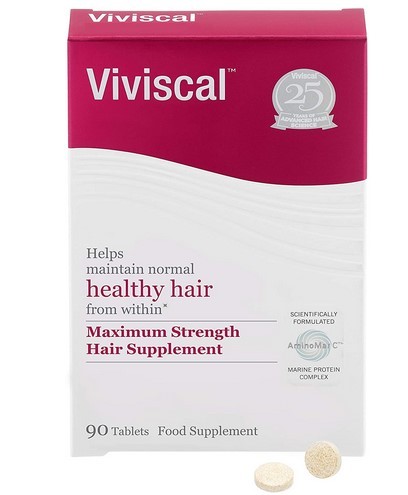
Price: $$$
According to the dermatologists we spoke to, this supplement has been proven to produce impressive results for postpartum women.
Viviscal is an amalgamation of minerals, vitamins, and a marine-based complex. It’s recommended to take it twice per day for three to six months. Viviscal is a great complement to the brand’s thickening and volumizing products to make hair feel more supple over time.
Notes: This is an oral supplement that might not be suitable for people who are nursing. (You must always consult your OB-GYN prior to taking any supplement during breastfeeding.) Reviewers also discuss uncomfortable side effects, such as nausea and diarrhea. They also say that it takes around three months for results to be seen.
Nutrafol Women Nutraceutical Supplement
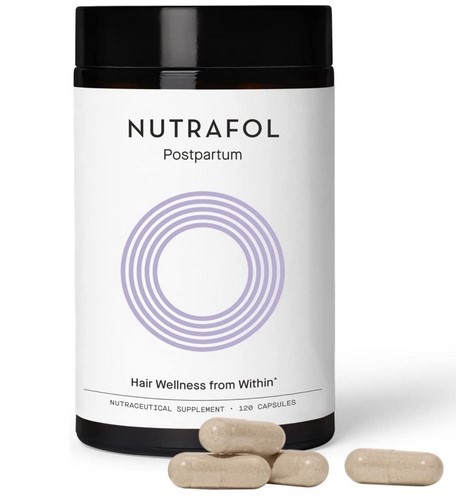
Price: $$$$
The research conducted by the trusted Source of this non-drug product for hair growth is remarkable, with a large number of women reporting an increase in hair thickness and growth.
Nutrafol is composed of plant-based ingredients along with marine collagen (which Nutrafol claims is derived is derived from North Atlantic cod, unlike the more threatening marine life such as sharks).
“It contains all natural ingredients that work to balance dihydrotestosterone (DHT), a hormone involved in some cases of male-or-female pattern baldness,” says Rina Allawh MD who is a dermatologist in Montgomery Dermatology located in King of Prussia, Pennsylvania.
Notes: Like Viviscal and Nutrafol are not recommended to use during pregnancy (or expecting) by women and those suffering from medical issues which require blood thinners. Additionally, some reviewers discuss the nausea symptoms, the irritability of packaging, and the high price.
The most effective treatment for topical issues
Women’s Rogaine 5% Minoxidil Topical Aerosol
This FDA-approved treatment could do amazing for hair loss postpartum. It increases the length of your growth phase of hair, but it also boosts the density of your hair as it gradually expands the hair follicles that are tiny to mature, thicker, and more terminal hairs, says Allawh.
“Despite initial shedding, consistent use of Rogaine for months has been shown to have favorable results for both sexes,” she declares. “In fact, Rogaine performs so well, I’m able to warn my patients against applying it to areas where they do not desire the growth of hair (i.e., face).”
The implications: There’s some speculation over the possibility that minoxidil, the primary ingredient in Rogaine, is suitable for women’s nursing. However, it is clear that the research conducted by the Trusted Source on minoxidil topical hasn’t found evidence to suggest that it poses a risk for breastfed babies.
OGX Nourishing Coconut Milk Anti-Breakage Serum
Price: $
For hair that is thin and prone to breakage, Allawh recommends this product from OGX could be a game-changer in fighting frizz and restoring moisture to dry hair.
“It’s light, nongreasy, and adds a nice shine to the hair,” she says.
It’s important to remember it’s important to note that the dryness of hair could be triggered by many factors that are not related to hormones. This includes over-processing your hair with color or using styling tools with heat frequently and also exposure to elements, such as the sun and water. If you’re susceptible to breaking as well as split hair, this treatment can help even after postpartum.
Olaplex Hair Perfector No. 3
Price: $$
It wasn’t with a recommendation from a dermatologist. However, hair stylists praise Olaplex for its capacity to repair and strengthen hair that is damaged the most I can confirm that it helped me bring my hair back to health after my birth!
It’s a concentrated product designed to be applied prior to you washing or conditioning hair. It aids in strengthening and re-fusing the hair’s bonds which results in more supple, healthier, and thicker hair overall.
It’s free of parabens, sulfates, or phthalates. So if you’re looking for those ingredients in your hair care products, this is a good choice.
How long will postpartum Dandruff and postpartum hair last?
Postpartum Dandruff is a temporary condition that can persist for a few months following the birth of birth. The average person loses approximately 100 hairs every day; however, not all at once, and you won’t be able to notice them.
If you’re expecting, hormones associated with pregnancy keep the hair from falling off, and your hair appears as gorgeous as a model’s or in such thickness that you could barely brush it. However, when the hormones fall back to normal levels, the hairs that are added fall too. The shed can last for months and usually peak about 4 months after giving birth.
If you’re struggling with a dry or itchy scalp or are struggling with an issue with Dandruff that’s incredibly difficult to manage, search for a shampoo to aid in tackling the unpleasant adverse consequences of losing hair postpartum.
When should you see a doctor?
Hair loss during postpartum may be normal, but it does not make it any less terrifying. According to a review of studies conducted by the Trusted Source, The condition is usually viewed as an issue for those who have experienced it. It can create anxiety or unease for those who haven’t.
The shed can last for months and usually peak about 4 months after giving birth, according to the American Academy of Dermatology (AAD). The majority of people notice an improvement in their appearance within the first year following the birth of their child.
However, there is a recommendation from AAD recommends visiting your doctor if it’s around a year since your hair hasn’t returned back to its normal fullness. It could be a sign that something else that’s causing you to lose hair.
What are the best home remedies to treat postpartum Dandruff?
There are many solutions at home that aid in treating postpartum Dandruff.
Tea tree oil
Tea tree oil has been utilized to combat Dandruff over the last several years. It is possible to add tea tree oil to your shampoo and apply it frequently to lessen the intensity of symptoms by 41% and to improve the appearance of itchiness and greasiness.
Apple cider vinegar
Apple cider vinegar can be a different home remedy that may help treat the dandruff problem. Mix equal amounts of apple cider vinegar with water and apply it on your scalp. Allow it to sit for 15 minutes before washing it off with water.
Coconut oil
Coconut oil is also used to treat Dandruff. Apply coconut oil on your scalp and allow it to sit for 30 minutes, then wash it out by using shampoo. You can also test dandruff shampoos that are available at the store with zinc, selenium, or ketoconazole.
Most frequently asked questions
How long will the hair loss postpartum be?
The majority of hair loss that occurs after pregnancy isn’t “hair loss” at all. It’s more of an excessive shedding, as per the AAD. The excessive loss usually begins in the first few months following the birth of a child.
The length of time it takes to last can vary depending on the individual. However, according to the AAD, the majority of people will see their hair returning to its usual fullness and volume prior to their child’s one-year birthday. And the majority will see it change to a more normal state before the age of one.
Are you able to grow your hair postpartum after the loss of hair?
It is possible that your hair was larger than usual during pregnancy because of estrogen levels. After birth, your estrogen levels decrease, which causes the hair you retained during pregnancy to shed. This is the reason why it’s frequently referred to as shedding but not actual loss.
As time passes, your hair will get back to its volume — that is, its pre-pregnancy state.
Are prenatal vitamins helpful in hair loss postpartum?
There’s no evidence to support taking prenatal vitamins to stop hair loss postpartum. But this doesn’t negate the significance of taking the prenatal vitamin.
If you’re expecting, your body has dramatically different requirements for different minerals, vitamins as well as trace elements. The National Institutes for Health’s Trusted Source suggests taking folate. The body requires greater amounts of folate in pregnancy. It is essential for the brain of a fetus and the development of the spinal column.
Your obstetrician will provide information on what supplements you should take and the best time to start them in the course of — or even prior to the time of your pregnancy.
Takeaways of Postpartum Dandruff
Feeling Postpartum Dandruff, hair thinning, or loss of hair might appear to be a minor price to pay to bring your adorable, tiny baby into the world, but this isn’t to say that it’s not a challenge.
Based on what you’re willing to invest (money and time), there are products available to help bring back some normality in your locks.
- AI Powered Bald Filter Online 2024: See Yourself with No Hair! - January 19, 2024
- Harklinikken Bad Reviews 2024: Analyzing Negative Feedbacks - January 18, 2024
- How to Get the Alex Eubank Hair | Step-By-Step Tutorial 2024 - January 18, 2024
